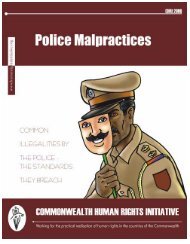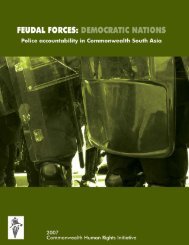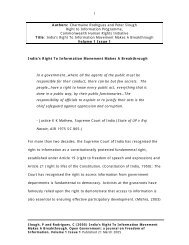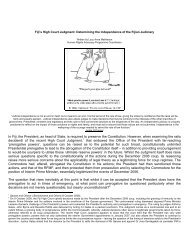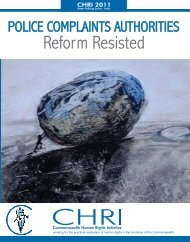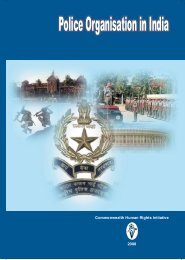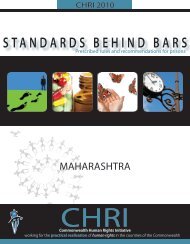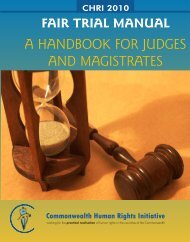chri executive summary 2003: looking for the right to information in ...
chri executive summary 2003: looking for the right to information in ...
chri executive summary 2003: looking for the right to information in ...
- No tags were found...
You also want an ePaper? Increase the reach of your titles
YUMPU automatically turns print PDFs into web optimized ePapers that Google loves.
Status of <strong>the</strong> Right <strong>to</strong> In<strong>for</strong>mation <strong>in</strong> <strong>the</strong> CommonwealthExplicit Constitutional Guarantee onlyAccess RegimeSpecific guaranteePart of speech & expressionNo Access RegimeAustralia Ghana Antigua and Barbuda BangladeshBelize Malawi The Bahamas Brunei DarussalamCanada Mozambique Barbados, Botswana The GambiaIndia Papua New Gu<strong>in</strong>ea Cameroon MalaysiaJamaica + Uganda Cyprus MaldivesNew Zealand + United Republic of Tanzania Dom<strong>in</strong>ica NauruPakistan Fiji Islands NamibiaSouth Africa # Grenada SamoaTr<strong>in</strong>idad and Tobago Guyana S<strong>in</strong>gaporeUnited K<strong>in</strong>gdom Kenya SwazilandZimbabwe* + Kiribati TongaLesothoMaltaMauritiusNigeriaSeychellesSierra LeoneSolomon IslandsSri LankaSt Kitts and NevisSt LuciaSt V<strong>in</strong>cent and <strong>the</strong> Grenad<strong>in</strong>esTuvaluZambiaVanuatu# Pakistan promulgated a Right <strong>to</strong> In<strong>for</strong>mation Ord<strong>in</strong>ance <strong>in</strong> Oc<strong>to</strong>ber 2002 but no access legislation has yet been passed.+ Not yet <strong>in</strong> operation.* The Zimbabwe law is so heavily qualified that it is tantamount <strong>to</strong> hav<strong>in</strong>g no access legislation.Resistance <strong>to</strong> change is strong when vested <strong>in</strong>terests have so much <strong>to</strong> lose.Consequently, Commonwealth governments unused <strong>to</strong> open<strong>in</strong>g <strong>the</strong>mselves up <strong>to</strong>scrut<strong>in</strong>y have been quick <strong>to</strong> offer justifications <strong>for</strong> not provid<strong>in</strong>g a guaranteed<strong>right</strong> <strong>to</strong> access <strong>in</strong><strong>for</strong>mation. None are compell<strong>in</strong>g. In <strong>the</strong>se turbulent times, an<strong>in</strong>creas<strong>in</strong>gly common argument trotted out by governments is that openness willcause great harm <strong>to</strong> national security or o<strong>the</strong>r important <strong>in</strong>terests of state. Thiscan be a legitimate concern. Clearly, sensitive <strong>in</strong><strong>for</strong>mation such as <strong>in</strong>telligencedata or <strong>in</strong>ternational trade secrets may need <strong>to</strong> be kept confidential. Issues arealso sometimes raised about breach<strong>in</strong>g privacy and damag<strong>in</strong>g commercial <strong>in</strong>terests.The reality is however, that <strong>the</strong> bulk of government-held <strong>in</strong><strong>for</strong>mation does notfall <strong>in</strong><strong>to</strong> sensitive categories. Much of <strong>the</strong> <strong>in</strong><strong>for</strong>mation requested by <strong>the</strong> public isuncontroversial. People want <strong>to</strong> know simple th<strong>in</strong>gs: what <strong>the</strong> priorities12CHRI <strong>2003</strong> REPORT: LOOKING FOR THE RIGHT TO INFORMATION IN THE COMMONWEALTH



